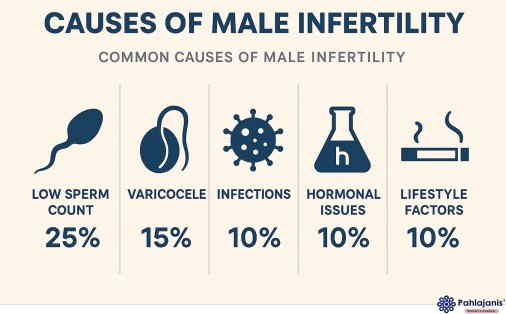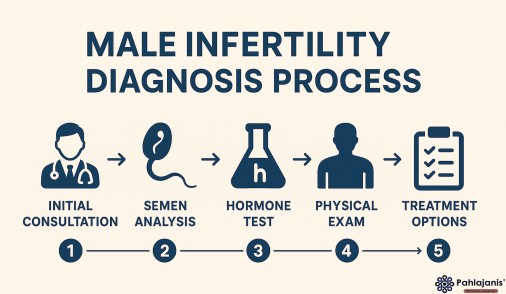What Is Male Infertility?
Male infertility means a man has problems with his reproductive system that make it hard or impossible to get a woman pregnant. It can be due to:
- Low sperm count
- Poor sperm motility (movement)
- Abnormal sperm shape
- Blockages or hormonal issues
- Genetic problems
- Lifestyle or environmental factors
Infertility doesn’t mean you’re sterile. It means getting pregnant may take longer or require treatment.
Struggling with low sperm count? Help is available in Bhilai: https://pahlajanis.com/infertility-in-men-and-women/
Signs You Might Have a Fertility Problem
Often, there are no obvious symptoms. Many men only find out something is wrong after trying to conceive for months or even years without success. But there are a few signs to watch for:
- Trouble with erections or ejaculation
- Pain, swelling, or lumps in the testicles
- Decreased facial or body hair
- Low sex drive
- Less semen volume during ejaculation
- Changes in mood or energy (possibly due to low testosterone)
These signs don’t always mean infertility, but they’re worth checking out—especially if you’ve been trying to conceive for more than 12 months (or 6 months if your partner is over 35).
Common Causes of Male Infertility
Many things can affect a man’s fertility. Some are physical, some hormonal, and some lifestyle-related. Here are the main ones:
- Low Sperm Count (Oligospermia): This is one of the top reasons for male infertility. A normal sperm count is 15 million or more per milliliter. Anything below that can reduce your chances of conception.
- Poor Sperm Motility: Even if the count is normal, sperm need to swim properly to reach the egg. Poor motility can make conception difficult.
- Varicocele: A swelling of the veins in the scrotum that affects sperm quality. It’s treatable with minor surgery.
- Infections: STIs, mumps, or urinary infections can cause inflammation or block sperm pathways.
- Hormonal Imbalances: Low testosterone or problems with the pituitary gland can reduce sperm production.
- Lifestyle Factors: Smoking, alcohol, obesity, stress, poor diet, and exposure to toxins or heat (like laptops or saunas) can lower sperm health.
When Should a Man Visit a Fertility Specialist in Bhilai?
Here’s the short answer: If you’ve been trying for over a year without success, see a specialist. If your partner is over 35, make it 6 months. Also, go sooner if:
- You’ve had testicular surgery or injury
- You have sexual performance issues
- You had cancer treatment
- You’re noticing symptoms (pain, swelling, low libido)
- You want peace of mind before planning a family
Don’t wait too long. Early testing and treatment can make a big difference.
Where to Get Male Infertility Tested in Bhilai?
Bhilai has a growing number of fertility clinics and diagnostic labs. Look for centers with experienced male fertility specialists in Bhilai or those offering andrology services.
A good fertility center will start with:
- Medical history review
- Physical examination
- Semen analysis test
- Hormone testing
- Ultrasound (if needed)
- Genetic testing (in some cases)
Make sure the center follows WHO guidelines for semen analysis. The accuracy of the test depends a lot on lab standards.
What Happens During a Semen Analysis?
A semen analysis looks at:
- Sperm count: Number of sperm per milliliter
- Motility: How well sperm move
- Morphology: Shape and structure
- Volume: Amount of semen
- pH and viscosity: Semen’s consistency
The test is usually done after 2–7 days of abstinence. You’ll provide the sample in a sterile container, and results are available in 1–2 days.
It’s simple, painless, and very helpful in guiding the next steps.
How Is Male Infertility Diagnosed and Treated in Bhilai?
Once test results are in, your fertility specialist will discuss the findings and suggest treatment. Here’s what it might include: 
- Lifestyle Changes: Stop smoking. Cut alcohol. Eat healthier. Sleep well. Manage weight and stress. These simple steps can sometimes fix the problem.
- Medications: Hormonal treatments (like hCG or FSH), antibiotics (for infections), or anti-inflammatory drugs may help.
- Surgery: For cases like varicocele or blockages in the sperm ducts, minor surgery can improve sperm quality.
- Assisted Reproductive Techniques (ART): When natural methods don’t work, ART options are used:
- IUI (Intrauterine Insemination): Sperm is inserted directly into the uterus.
- IVF (In Vitro Fertilization): Egg and sperm are fertilized outside the body, and the embryo is implanted.
- ICSI (Intracytoplasmic Sperm Injection): A single sperm is injected into the egg. Useful for very low sperm counts or poor motility.
In Bhilai, clinics now offer all these options under one roof. Treatment depends on the exact diagnosis and the couple’s preferences.
Does Treatment Work?
Yes, in many cases it does. According to the Indian Society of Assisted Reproduction (ISAR), the success rate of ICSI is about 35–40% per cycle in India. IUI success rates are lower (10–15% per cycle) but less expensive.
Success also depends on the woman’s age, sperm quality, and overall health of both partners.
What About Emotional Health?
Male infertility can affect your confidence, self-worth, and relationships. You’re not alone. Many couples face this silently, often feeling shame or guilt.
Talking to a counselor or therapist helps. Also, opening up to your partner without blame or judgment is important. It’s a shared journey.
Cost of Male Infertility Treatment in Bhilai
Here’s a rough breakdown:
Treatment Type | Estimated Cost (INR) |
| Semen Analysis | ₹800 – ₹1500 |
| Hormone Tests | ₹1000 – ₹3000 |
| Varicocele Surgery | ₹40,000 – ₹70,000 |
| IUI Procedure | ₹8,000 – ₹15,000 |
| IVF (with ICSI) | ₹1.2 – ₹1.8 lakh |
Costs vary by clinic, technology, and medications used. Some clinics offer EMI plans or bundled treatment packages.
Book your male fertility checkup at Pahlajanis’ IVF Center now: https://pahlajanis.com/contact-us/
Why Many Couples Choose Pahlajanis’ IVF Center in Bhilai
If you’re searching for Male Infertility Treatment in Bhilai, Pahlajanis’ IVF Center is one of the leading names. With over 20 years of experience in fertility care, they offer specialized services for men including semen analysis, sperm freezing, ICSI, and male hormonal evaluation.
Their center has in-house andrologists and fertility experts, advanced lab setups, and supportive counseling services. Patients value their clear guidance, privacy, and realistic approach to treatment. Whether you’re just starting your journey or looking for second opinions, they offer the right mix of experience and care.
Final Thoughts
Male infertility isn’t something to hide or be ashamed of. It’s a medical condition, and in many cases, it can be treated. If you’re living in Bhilai and think something might be wrong, get tested. Talk to a specialist. Ask questions.
There’s no guarantee that every treatment will work. But doing nothing guarantees nothing will change.
Taking that first step can make all the difference.



This guide breaks down a complicated topic really clearly. I especially appreciate how it encourages men to be proactive instead of waiting until fertility becomes a crisis.
It’s surprising how many men aren’t aware of their role in infertility until they try to conceive. The shift towards more awareness and access to male infertility treatments in Bhilai is a big step forward. It’s great to see more men being proactive about their health.